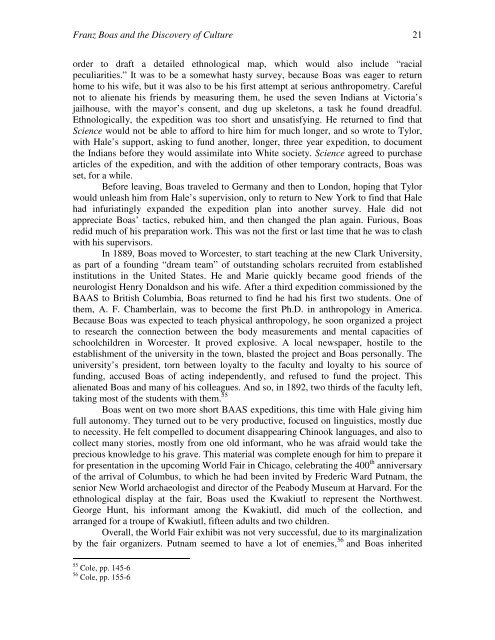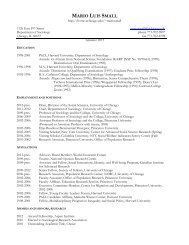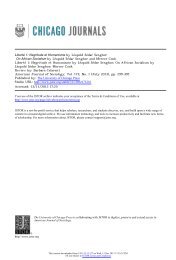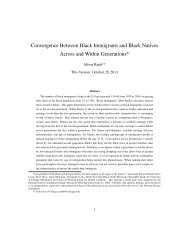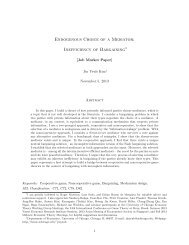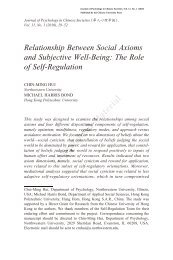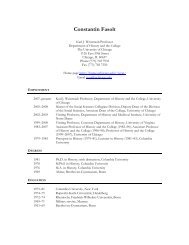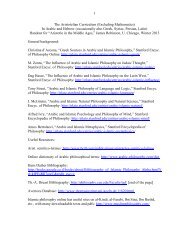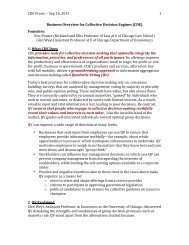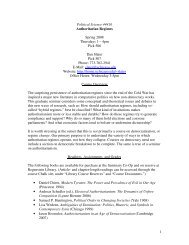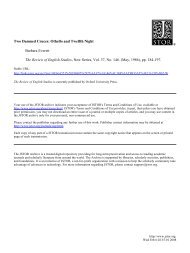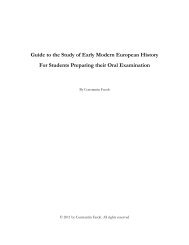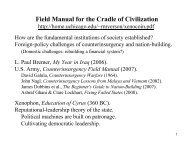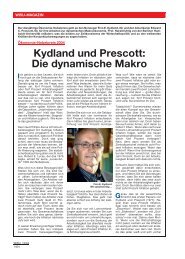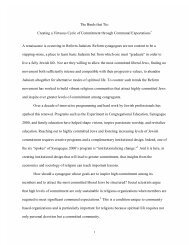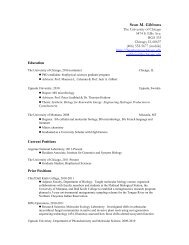Franz Boas and the Discovery of Culture - Personal Web Pages ...
Franz Boas and the Discovery of Culture - Personal Web Pages ...
Franz Boas and the Discovery of Culture - Personal Web Pages ...
You also want an ePaper? Increase the reach of your titles
YUMPU automatically turns print PDFs into web optimized ePapers that Google loves.
<strong>Franz</strong> <strong>Boas</strong> <strong>and</strong> <strong>the</strong> <strong>Discovery</strong> <strong>of</strong> <strong>Culture</strong> 21<br />
order to draft a detailed ethnological map, which would also include “racial<br />
peculiarities.” It was to be a somewhat hasty survey, because <strong>Boas</strong> was eager to return<br />
home to his wife, but it was also to be his first attempt at serious anthropometry. Careful<br />
not to alienate his friends by measuring <strong>the</strong>m, he used <strong>the</strong> seven Indians at Victoria’s<br />
jailhouse, with <strong>the</strong> mayor’s consent, <strong>and</strong> dug up skeletons, a task he found dreadful.<br />
Ethnologically, <strong>the</strong> expedition was too short <strong>and</strong> unsatisfying. He returned to find that<br />
Science would not be able to afford to hire him for much longer, <strong>and</strong> so wrote to Tylor,<br />
with Hale’s support, asking to fund ano<strong>the</strong>r, longer, three year expedition, to document<br />
<strong>the</strong> Indians before <strong>the</strong>y would assimilate into White society. Science agreed to purchase<br />
articles <strong>of</strong> <strong>the</strong> expedition, <strong>and</strong> with <strong>the</strong> addition <strong>of</strong> o<strong>the</strong>r temporary contracts, <strong>Boas</strong> was<br />
set, for a while.<br />
Before leaving, <strong>Boas</strong> traveled to Germany <strong>and</strong> <strong>the</strong>n to London, hoping that Tylor<br />
would unleash him from Hale’s supervision, only to return to New York to find that Hale<br />
had infuriatingly exp<strong>and</strong>ed <strong>the</strong> expedition plan into ano<strong>the</strong>r survey. Hale did not<br />
appreciate <strong>Boas</strong>’ tactics, rebuked him, <strong>and</strong> <strong>the</strong>n changed <strong>the</strong> plan again. Furious, <strong>Boas</strong><br />
redid much <strong>of</strong> his preparation work. This was not <strong>the</strong> first or last time that he was to clash<br />
with his supervisors.<br />
In 1889, <strong>Boas</strong> moved to Worcester, to start teaching at <strong>the</strong> new Clark University,<br />
as part <strong>of</strong> a founding “dream team” <strong>of</strong> outst<strong>and</strong>ing scholars recruited from established<br />
institutions in <strong>the</strong> United States. He <strong>and</strong> Marie quickly became good friends <strong>of</strong> <strong>the</strong><br />
neurologist Henry Donaldson <strong>and</strong> his wife. After a third expedition commissioned by <strong>the</strong><br />
BAAS to British Columbia, <strong>Boas</strong> returned to find he had his first two students. One <strong>of</strong><br />
<strong>the</strong>m, A. F. Chamberlain, was to become <strong>the</strong> first Ph.D. in anthropology in America.<br />
Because <strong>Boas</strong> was expected to teach physical anthropology, he soon organized a project<br />
to research <strong>the</strong> connection between <strong>the</strong> body measurements <strong>and</strong> mental capacities <strong>of</strong><br />
schoolchildren in Worcester. It proved explosive. A local newspaper, hostile to <strong>the</strong><br />
establishment <strong>of</strong> <strong>the</strong> university in <strong>the</strong> town, blasted <strong>the</strong> project <strong>and</strong> <strong>Boas</strong> personally. The<br />
university’s president, torn between loyalty to <strong>the</strong> faculty <strong>and</strong> loyalty to his source <strong>of</strong><br />
funding, accused <strong>Boas</strong> <strong>of</strong> acting independently, <strong>and</strong> refused to fund <strong>the</strong> project. This<br />
alienated <strong>Boas</strong> <strong>and</strong> many <strong>of</strong> his colleagues. And so, in 1892, two thirds <strong>of</strong> <strong>the</strong> faculty left,<br />
taking most <strong>of</strong> <strong>the</strong> students with <strong>the</strong>m. 55<br />
<strong>Boas</strong> went on two more short BAAS expeditions, this time with Hale giving him<br />
full autonomy. They turned out to be very productive, focused on linguistics, mostly due<br />
to necessity. He felt compelled to document disappearing Chinook languages, <strong>and</strong> also to<br />
collect many stories, mostly from one old informant, who he was afraid would take <strong>the</strong><br />
precious knowledge to his grave. This material was complete enough for him to prepare it<br />
for presentation in <strong>the</strong> upcoming World Fair in Chicago, celebrating <strong>the</strong> 400 th anniversary<br />
<strong>of</strong> <strong>the</strong> arrival <strong>of</strong> Columbus, to which he had been invited by Frederic Ward Putnam, <strong>the</strong><br />
senior New World archaeologist <strong>and</strong> director <strong>of</strong> <strong>the</strong> Peabody Museum at Harvard. For <strong>the</strong><br />
ethnological display at <strong>the</strong> fair, <strong>Boas</strong> used <strong>the</strong> Kwakiutl to represent <strong>the</strong> Northwest.<br />
George Hunt, his informant among <strong>the</strong> Kwakiutl, did much <strong>of</strong> <strong>the</strong> collection, <strong>and</strong><br />
arranged for a troupe <strong>of</strong> Kwakiutl, fifteen adults <strong>and</strong> two children.<br />
Overall, <strong>the</strong> World Fair exhibit was not very successful, due to its marginalization<br />
by <strong>the</strong> fair organizers. Putnam seemed to have a lot <strong>of</strong> enemies, 56 <strong>and</strong> <strong>Boas</strong> inherited<br />
55 Cole, pp. 145-6<br />
56 Cole, pp. 155-6


